With billions of euros handed out in prize money every year, the Spanish Christmas lottery is the biggest in the world.
Walk through the center of Madrid—or any Spanish city or town—this time of year, and you’ll already start to see this beloved tradition come to life. Lines spill out of lottery booths and wind down the street beneath twinkling holiday lights. Millions of Spaniards will pick up a lottery ticket (or several) in between running errands and holiday shopping, all eager to try their chance at the big jackpot, known as El Gordo (which literally means “the fat one”).
If you’re thinking that the Spanish Christmas lottery seems to be a much bigger deal than most other lotteries you’re familiar with, you’re not wrong. Here’s how this annual tradition came to be, why it’s important to so many everyday people here in Spain, and why you don’t want to miss out.
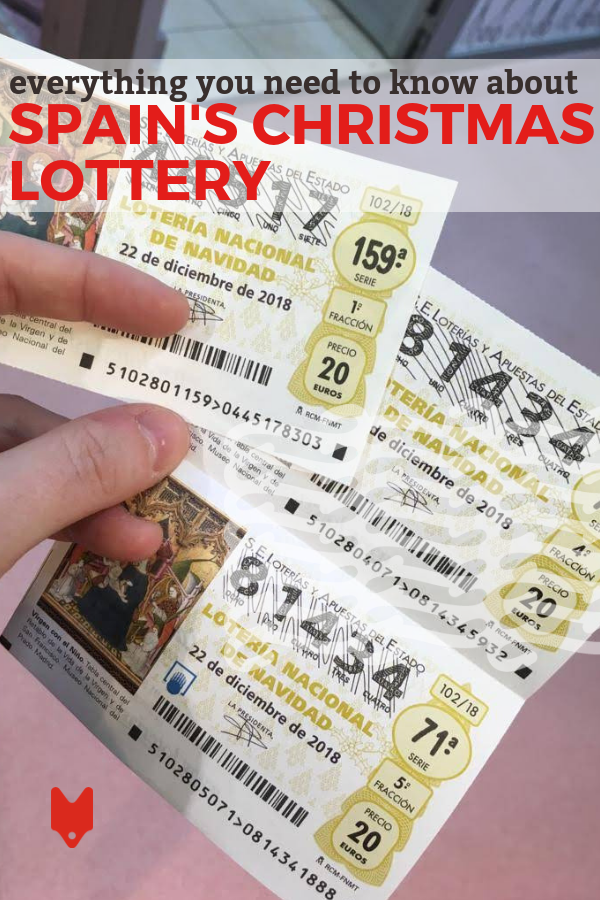
Must-know vocab for the Spanish Christmas lottery
Before you run out and buy a full lottery ticket (don’t do that, unless you want to drop €200), you should know what you’re getting into. Here are some of the most common terms and phrases you’ll hear being tossed around in reference to the Spanish Christmas lottery.
- Billete: A lottery ticket. Like we said, the whole thing will set you back €200. It’s divided into 10 décimos of the same number that belong to the same serie. The drawing consists of 170 series and there are 170 billetes for every número.
- Décimo: One-tenth of a lottery ticket, which sells for €20.
- Número: The main five-digit number of a billete, décimo or participación.
- Participación: A smaller fraction of a décimo. Many small businesses or even some individuals will buy décimos and then divide each of them into a certain number of participaciones for others to purchase at a price of the décimo owner’s choice.
- Serie: A set of billetes with the same número. Each serie consists of 100,000 billetes.
From wartime fundraiser to festive tradition
Despite the cheerful fun that the lottery evokes throughout Spain nowadays, its roots lean towards the grim side. The very first Christmas lottery took place in Cádiz in 1812, when the government set it up as a way to raise money for the Spanish troops fighting against Napoleon’s armies.
Back in the day, a single lottery ticket cost 40 reales, which would equal out to only six euro cents in modern currency. The grand prize: a whopping 8,000 pesetas, which would be just under €50 today.
Today, the average Spaniard spends even more than that amount on lottery entries every year—an average of €66. 16 per person, to be exact, according to the State Lottery Association. And El Gordo, naturally, has increased as well. The top prize now clocks in at around €4 million, but hundreds of smaller prizes are also up for grabs.
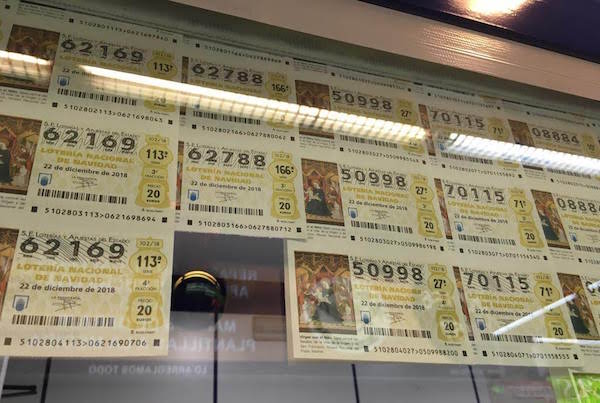
“The greatest prize is sharing”
You’re probably thinking that while €4 million is nothing to scoff at, it doesn’t sound like a whole lot of money for a lottery jackpot. Take into account that most people who have the winning number only get one tenth of that money, and it’s even more bewildering. Why is a top prize of around €400,000 so appealing?
The truth is that the novelty of the Spanish Christmas lottery isn’t the amount of prize money that the winners get. What makes this lottery special is the idea of sharing the prize among family and friends.
A full lottery ticket itself costs €200, which is a lot to drop at once. However, each ticket is divided into 10 décimos, which cost just €20 each. Every décimo on the ticket has the same five-digit number, and that same number can be repeated dozens of times across several full tickets. As a result, the prize is divided among everyone who shares that same number.
The splitting of the prize money is what makes the Spanish Christmas lottery such a beloved tradition, as well as the root of the lottery’s slogan, “El mayor premio es compartirlo” (“The greatest prize is sharing”). Many families or groups of friends will all chip in for a décimo to be shared among everyone.
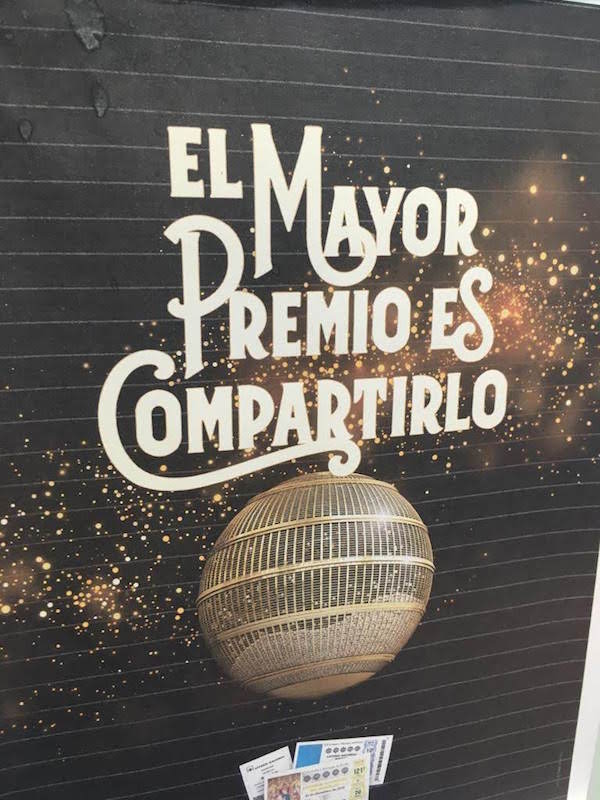
Don’t be left out
It doesn’t just end with décimos, though. Many bars, restaurants and shops will also sell participaciones, which are portions of a full lottery ticket even smaller than décimos, for less money. Keep your eyes open for participaciones for sale at local businesses as you go about your day, and you’ll see just how deeply ingrained this tradition is in everyday life.
“They almost guilt you into buying your lottery numbers from them,” jokes Rafael, a Córdoba resident whose family enjoys participating in the yearly tradition. “Every place has a sign that says ‘Y si toca aquí?‘ [roughly translated to ‘What if the jackpot strikes here?’]. You’ll see them at the butcher’s, the grocery store, the little bar down the street. They know you can’t possibly buy numbers at every place you go regularly.”
So let’s say you buy a décimo or a participación with the number 05714 from your favorite neighborhood bar. If that number wins, you and everyone else with a ticket number of 05714—most likely other regular customers at that same establishment—will all get a cut of the prize money.
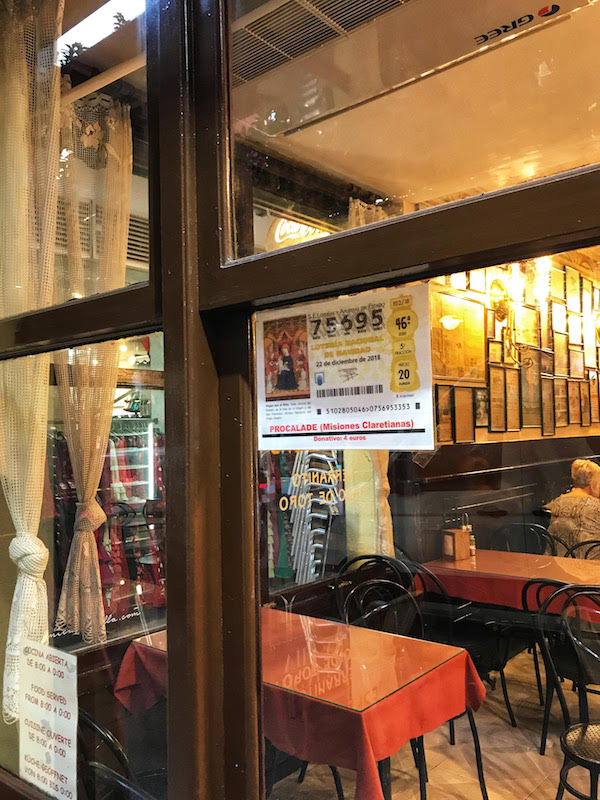
“You don’t want to be the only one among your friends and family who doesn’t get a lottery number from a certain place,” says Gloria, Rafael’s daughter. “God forbid that number wins—everyone else you know gets part of the prize and you’re stuck with nothing but bad luck.”
Certainly nobody could possibly be so unlucky, right? It’s not impossible—just ask Costis Mitsotakis.
In 2012, the Greek filmmaker was the only person in the small town of Sodeto to not purchase a lottery ticket. The winning jackpot number that year was the one that Sodeto’s 250 residents, making up 70 households, had all purchased shares of from the local homeowners’ association. Each household took home more than €100,000 in prize money that year.
Fortunately, Mitsotakis’s story has a happy ending. After the lottery, a newly wealthy neighbor used his share of the prize money to purchase some land that Mitsotakis had been trying to sell, so he ended up with some cash after all.
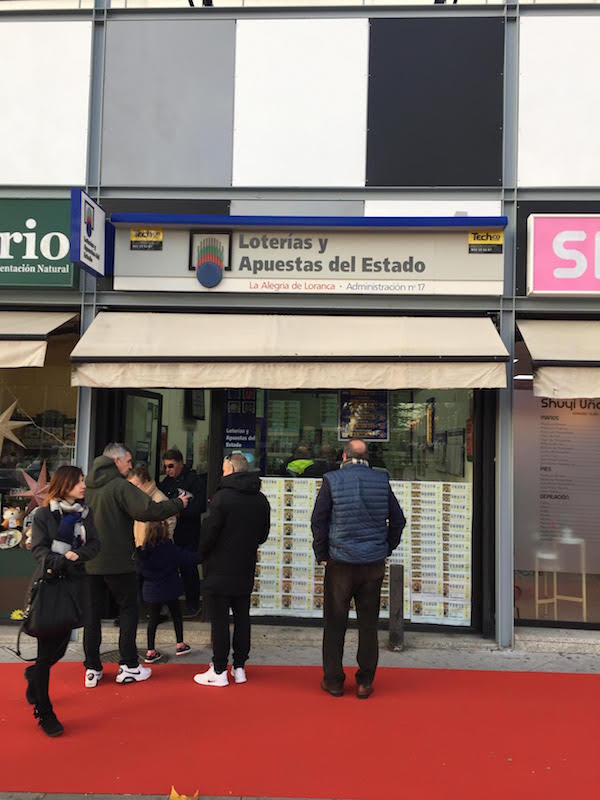
Lucky numbers
While plenty of people will simply play whichever number happens to be available at their favorite local bar, many Spaniards choose theirs carefully. A common question you’ll hear people ask each other is “En qué termina?” or “What does it end in?” While choosing the exact five numbers you want to play is quite difficult (although you can do so online), many people will at least try and make the last two numbers mean something.
“People sometimes try and buy numbers that represent important dates—their child or partner’s date of birth, or anything important like that,” says Gloria. “Or maybe if someone has passed away, if that person always played the same number, their family members will continue to get that same number every year.”
“If I had to get all the same numbers my father—may he rest in peace—used to play, I wouldn’t have any money left over,” Rafael chimes in with a laugh. “The most common one he played was 90, though, so that’s the number we get every year.”
Another novelty also comes from collecting lottery entries from faraway cities.
“A lot of times when someone goes out of town, their friends and family will ask them to get a décimo from whatever city they’ll be in,” says Rafael’s son, Rafa. “It’s fun to get numbers from different places.”
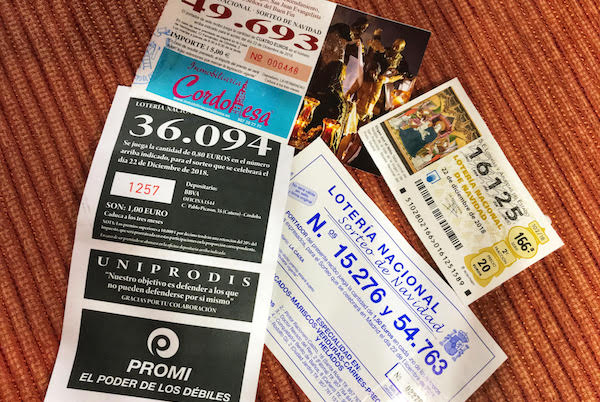
The moment of truth
With ticket sales starting as early as mid-July, the excitement surrounding the Spanish Christmas lottery takes up a good portion of the year. It all culminates at 9 a.m. on December 22, when millions all over the country tune in to watch the winning numbers being drawn.
It might surprise first-time viewers of the lottery drawing telecast to see that those who do the honors are actually children. These kids are students at the San Ildefonso Elementary School in Madrid. They reach into two large vessels onstage and pull out one small wooden ball at a time from each: one with the ticket number, and one with the prize money to be associated with that number. As they pick the numbers and prizes, they sing them out loud.
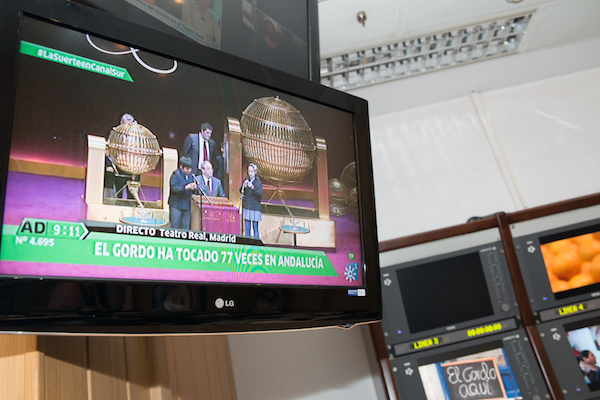
How did these kids end up with such an important responsibility on the national stage? This part of the tradition dates back to the San Ildefonso school’s former days as an orphanage.
Legend has it that the orphans would make their way through the streets of Madrid singing Christmas carols. They drew the attention of city and lottery officials, who gave them the task of drawing the winning numbers under the pretense that orphans would not cheat the system. Surprisingly, it wasn’t until 1984 that the first female students participated in the lottery announcement—before that, it was only boys!
Even if you didn’t buy a décimo this year, tune in to watch this tradition come to life a few days before Christmas. From the angelic voices of the children, to the tears of joy shed and bottles of cava popped by the winners, you’ll see that the Spanish Christmas lottery is something truly magical—especially when shared.






Clear explanation on the Spanish Christmas lottery. Thanks for sharing this post.
Our pleasure! It’s such an interesting tradition 🙂
I want to play lottery
It’s a lot of fun!
Playing lottery in Spain. Really Cool!
Thanks so much for reading!
Enjoy! Enjoy! Playing lottery during the Christmas season in SPAIN!
You can’t visit Spain around Christmastime and not take part in the fun! Thanks for reading!
Love to play lottery!
Us too—the fun is in sharing the prizes!
Playing lottery during the Christmas season in Spain!
It’s one of our favorite traditions!
Wow. That was both confusing and exciting. So different from the Lottery playing twice a week here.
Very true haha! Glad you enjoyed, Peter!